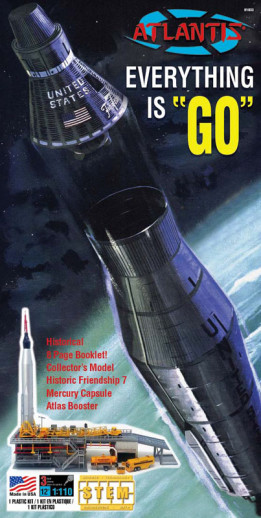We use cookies to make your experience better. To comply with the new e-Privacy directive, we need to ask for your consent to set the cookies. Learn more.
Atlas with Mercury Capsule Model
Create a historical replica model of the Mercury Capsule and Atlas Booster of 1962 with this model kit. This could be a fun supplement for those learning about modern history, or a vintage-looking spacecraft for a model-kit hobbyist. The included instruction manual features step-by-step instructions, as well as a recommended paint guide for parts, and icons for decal locations throughout the steps. Necessary for building, but not included is model cement, sharp objects (x-acto knife or other thin blade), tape, model paint, rubber bands, heated screwdriver end, and spruce cutters. Many of the model pieces are small and thin, requiring much caution when removing the burrs and connecting pieces. A small historical pamphlet is also included, featuring information about the original spacecraft and its passengers. Completed model is 20.5" long and 12.75" tall. ~ Brianna
1/110 Scale. Molded in Gray and Yellow plastic with STEM educational booklet, water slide decals. Over 150 parts!
On February 20, 1962, John Herschel Glenn, Jr. piloted the Mercury Atlas Friendship 7 spacecraft on America's first manned orbital mission of the Earth. After Launching from Kennedy Space center in Florida, Glenn successfully completed a three-orbit mission around the Planet. The Mission lasted 4 hours, 55 minutes, and 23 seconds from launch to impact, and during it Glenn reached an orbital velocity of 17,500 miles hour and a maximum altitude of approximately 162 miles. The flight was received with great enthusiasm and relief in the United States and many other countries, it also gave the United States even more hope of someday reaching the moon.
| Product Format: | Other |
|---|---|
| Grades: | 8-AD |
| Brand: | Atlantis Models |
| EAN/UPC: | 850002740066 |
| Length in Inches: | 15.875 |
| Width in Inches: | 8 |
| Height in Inches: | 2.1875 |
| Weight in Pounds: | 1.05 |
Be the first to review this item
- Start typing and we'll see if it was already asked and answered.
- If there aren't already some matches, submit a new question.
- You'll get fast answers from customers who really own the item(s) and from our product experts. (About half the time you'll get an answer in under 2 hours!)
- Which items will best meet your needs
- What customers who own an item think of it
- How to use, fix, or take care of an item
- Product information
- General advice related to the types of products we sell
- Our store policies
For questions about an order you have placed, please contact customer support directly.

















school project